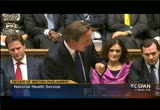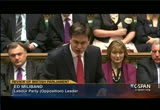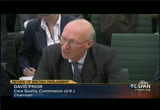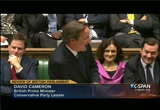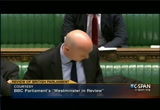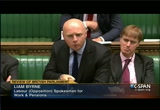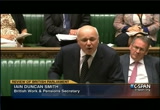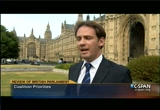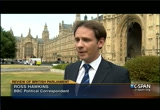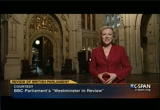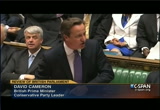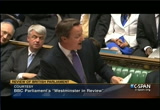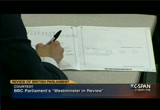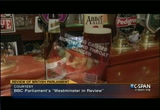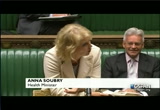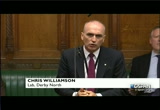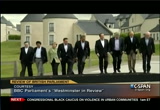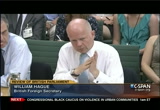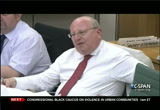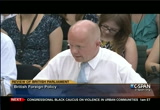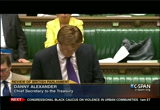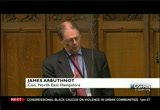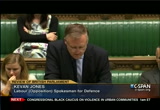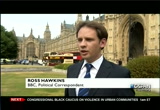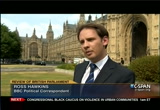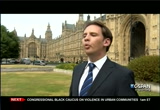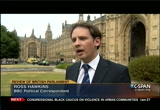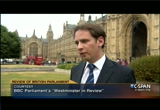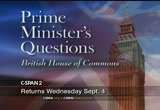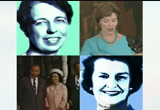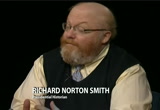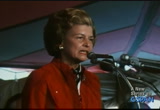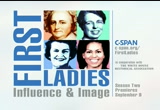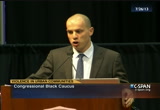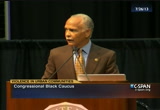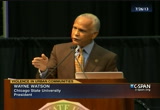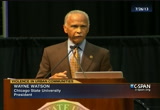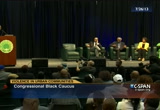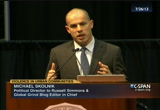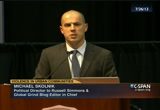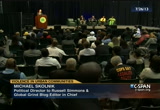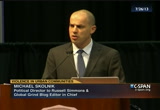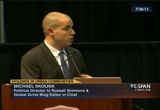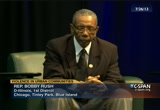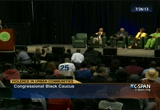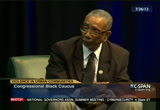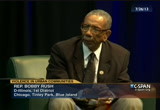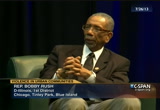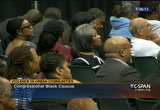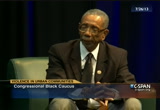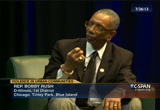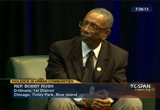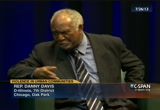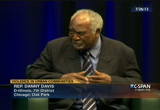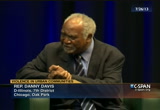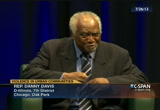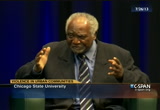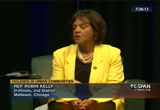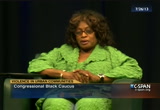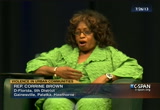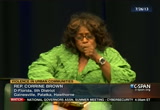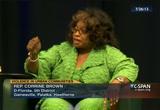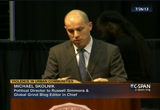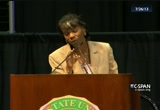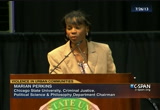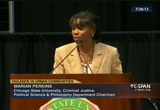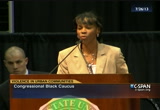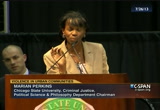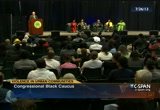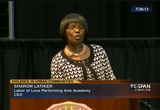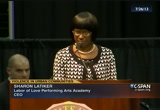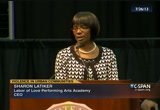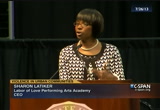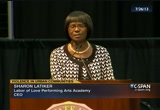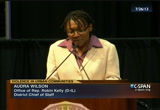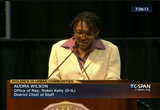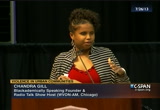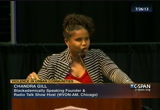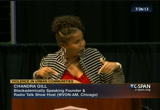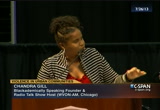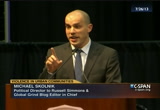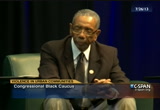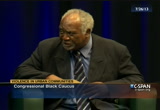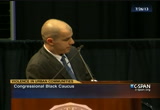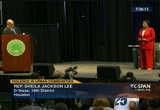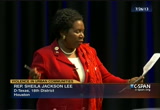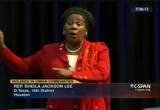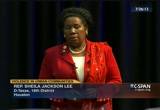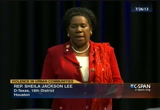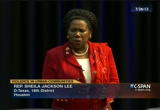tv Road to the White House CSPAN August 5, 2013 12:30am-2:01am EDT
12:30 am
>> we have met targets. there was a problem in the first part of the year. a medical director will be holding an investigation. the crucial fact is over the last three years, there are one million more people walking into our emergency units every year. as the chief executive of the confederation recently said that. they have been compounded by three years of structural reform. in other words, the top-down reorganization nobody wanted and nobody voted for. why is this customer every bite in the health service knows. that top-down reorganization that verdict resources away from patient care. -- why is that? everybody in the
12:31 am
health services no. >> they only have to look at the hospital. they have to look at the wells and have not met any of their targets. and we have been scrapping it. there are fewer administrators. he would cut the nhs. >> they described -- executives accused of deleting an internal review that was critical of the on inspection. the trio denied any wrongdoing. when he appeared before committee, the new head of the organization said they had change.
12:32 am
>> subsequent actions have radically overhauled. the entire senior management team has left. i will make actually clear -- [indiscernible] it has been changed. it has been dramatically changed. we are completely changed in the way that we register the way we monitor in the way that we inspect hospitals. mike richards joined us at the end of july. this is going forward, will be radically different. >> away from health, the other
12:33 am
major will battle -- the other major battleground has been benefits. a family with an adult earning more than 50,000 pounds lost child benefits. it was a controversial policy. labor eventually said it would not reverse. >> beyond benefits, has the prime minister received any representation on welfare reform from the party opposite? >> i know i been the one on holiday. they have been the ones taking, how can i put it, policy altering substances. last week, they were in favor of child benefits. now they are against it. in favor of -- only this morning, we find out that they may not go ahead with this policy of scrapping the benefits. the truth is the leader of the
12:34 am
opposition is allowed to make coffee but did not tell him what the policy is. >> cuts to housing benefits would be deemed a success despite claims that impact was worth it. housing benefit recipients had their payments cut by 14 pounds a week. the national housing federation said the changes will larger houses are lying empty. opponents have labeled the policy profoundly indecent. in the comments, labor said the bedroom text cost more than it saved. >> whether to give the bedroom tax is a runaway success. >> it is proven a success. what it is doing is finally drawing a line on the failure of the last government to sort out
12:35 am
the mess in social housing. the social housing benefit that doubles and will rise by another 5 billion. we will never hear from here -- hear from him about their full- year because they love so many people in overcrowded accommodations in the waiting list had grown to 1.5 million. the house he liked to tell us if he will reverses policy are not perhaps he would like to tell us if he will reverse this policy are not? what's the pension benefit such as the house, the better broom tax would resolve -- and the bedroom tax would resolve. they are not overcrowded. they are empty. we have got military families
12:36 am
said they have been lied to and cheated. this cuts more than essays. his government should be taxing dimensions not embed rooms. -- this cuts more than it saves. >> they left huge amounts of empty homes. 70 degree thousand below -- 73,000 below the pink. long-term empty homes down 20,000 since they left office. the reality is this. the party opposite left a shambles and what you got now is people in overcrowded accommodations never once did they hear from the labour party about them. they are having to suffer a while we subsidize to nearly one billion pounds for people to live in houses with spare rooms. perhaps, if he ever goes into office to reverse it, why does he stop moaning about it? >> the battle over benefits.
12:37 am
the question i put forward to our correspondent. the tories have decided to send the fight to welfare and end the chase, why set the strategy and decided to pursue? >> they are in a pretty chipper mood. you see a much brighter, happier conservative party. they have a private movement they been able to adhere. it still succeeds in bringing around unity. they can blame opposite tears. you see them getting together a message about the welfare. you have for the strong impressions. some senior people have doubted whether this big reform is going to be successful. they talk about the web for cap with gusto. they think they are onto
12:38 am
something which the public will like. a lot of language and confident there. has that changed the fundamentals? not necessarily. i did not get their bound review. they were looking at the numbers. they are still pretty gloomy. they are enjoying taken the fight to labor. the question will be as we get near the general election, a pretty tiny majority starts to worry about their seats of the service side. >> george osborne has said there will be no new taxes. those kind of policies are going to be difficult for labor to fight back on. >> and that deliberately putting those policies in place so they can have it. that was the point. the amount of benefits to be spent over any time. that would argue against this if you go tough enough. we see that confidence because they think a work against the labour party. i think they can situate not only what i see as policy but to the weak points as they see it. also on immigration, pick
12:39 am
something for which they hope they can reach a target. bringing immigration down to net migration to tens of thousands. they believe they are making progress. none of that is going to get away from the problem of the lack of a boundary review. none of the crucially is going to save them if the economy does not perform. >> will hear from you one last time later in the program. prime minister's questions which takes place on the other end of the corridor in the house of commons is a rather rowdy affair. there was one session at the start of july that was and what his anybody can remember. it was around the selection of labor candidates at the next general election. it is alleged the union unite had encouraged its members to join the local party to support the selection of a favorite union candidate. the union denied it had done anything wrong. labor officials did take over
12:40 am
the selection process. in prime minister's questions, and miller band try to ask about the policy on schools. -- ed milibrand tried to ask about policy of the schools. >> it is 21 billion over the next six years. that is what we are doing. what is so interesting is that he is taking from the trade union, they do not like choice. they do not like new schools. they do not like free schools. they want to control everything. what we know is that while organization they do have control over. we see it in black-and-white. they have taken control over the labour party.
12:41 am
>> i am speaking. mr. speaker, i am speaking for parents up and down this country. sir, very low grade, very low standard heckling. let's try to have some decorum and which the public can respect. let's have a debate about ethics. >> this is a prime minister that is had dinners with donors. he brought india to the heart of downing street. the idea he is lecturing us about ethics takes several standards to a whole new level. >> the fact is i have it here. mr. speaker, kate unite plan to change the labour party? i am know you are paid to shout by unite. let us calm down a bit. the relationship has to change.
12:42 am
once class-based election campaign. that is what this shows. two weeks to stand up to 90 union. two weeks to run union. >> following those bruising exchanges, ed milibrand said he wanted to ended. a change that could potentially see income dropped dramatically. that was not all plain sailing. the education secretary had his eye on the exam system for some time which suggests a radical changes. thatto toughen up the range of subjects including math, business, and history to make
12:43 am
the more ambitious, and rigorous. to look after more children was also abandoned. it would've allow an increase in the ratio of children to parents as a it met the standards. the prime minister opposed the idea and it was dropped. there were two changes in public health policy. they showed proposals for alcohol. it considers a base price of 45 pence per unit. the home office said there was that another concrete evidence the move richard -- will reduce problem drinking. in july, a decision on it using plain packaging for cigarettes. the government says similar decisions and australia had cut
12:44 am
the smoking. they delayed. they convinced them of being influenced by the tories. >> you have to have a heart of stone. this humiliating policy. she has been personally persuaded of the case of plain packaging. we have to ask on this side of the house, what happened? we suspect that the linden crosby happened. >> mr. speaker, could i apologize for the fact that apparently i have been speaking far too quietly for perhaps the first in my life? the honorable lady clearly did not hear what i said. i will repeat it. we have not made a decision. we have decided to wait to see
12:45 am
quite a relief the evidence as it emerges from australia. >> the minister will recall the last time i raised this, i would see the light. i'm delighted that they have seen the light. on this particular issue. >> the government has agreed to do the right thing. i would encourage on this matter. [indiscernible] and for that i am truly grateful. >> shameful that it wants to recruit more children as sending them to an early grave. whether linden crosby has had any conversations with any ministers on this issue. >> mr. crosby has not had any
12:46 am
conversations with any house minister. >> the prime minister will reassure this is not been kicked out. it may well be. >> as i've explained, there's been no change of policy at all. >> the situation in syria that is caused when it debuted -- more than 80,000 people to die. there's been many moments when the regime seemed in danger of collapse. there has been numerous reports that the regime was receiving supply of arms from iran. it was raised at the g-8 in northern ireland. before secretary has made numerous statements whether they have a say before the government pursued any policy of arming the rebels. when he appeared before for affairs committee just before
12:47 am
the summer recess, william hague was asked exactly what the government's position was. >> the report said concern last night, arming the opposition. is this an accurate report is mark >> no. there will be no change in the government policy of this. as i've said to the house many times, we have made no decision to send arms to the syrian opposition. as i have also made clear, will present to the house for a vote. we have not ruled out. we cannot foresee how this crisis will develop. will not rules that out.
12:48 am
would've made no decision. would've not made any decision. >> he was asked about supplying nonlethal equipment including protection against chemical weapons. >> your latest supply of equipment to the syrian opposition. will not be objective about it. there are one or two reservation. >> the chemicals -- >> that is what we had this morning. >> chemical weapons have been used. will not allow people to remain in a situation like his. >> they are different from gas masks. [indiscernible] >> is supplied for this chemical protection.
12:49 am
you believe there's a chance there will be a fighting situation? >> i do believe given the pattern of events over the last six months or year, the use of chemical weapons in a small, localize way they may repeat it. >> or is that just the belief? >> it does happen though quite a number of the patients. -- vocations. people do obey orders. -- it does happen on quite a number of locations. >> that given authorization for the use of chemical weapons. >> the regime has. i have not identified who in the regime. we have evidence of the repeated on a small-scale use of chemical weapons. yes, i do think that. >> the collation agreement on
12:50 am
the liberal democrats and the service agreed to disagree on a nuclear deterrent. the conservatives favor a like replacement. the liberal democrats want to cut the number of democrats. it will be decided on 2016 after the next general election. >> the review, and is the most comprehensive study ever published by the uk government. a large number remains. it continues. it is right that the uk should retain a nuclear capability for as long as the global security situation make the necessary. i also believe that capability should be scaled and deployed to the threats we face now and held as a contingency for the threats we may face the future. we should seek the balance of this policy i guess the need to
12:51 am
defend and other priorities. the conclusion i draw from the review is that while alternatives exist, there is no new system available before the lives come to an end to meet those criteria. there is a step down the ladder of gullible and the 24-hour patrols. moving on from a cold war concept to one fit for the world we inhabit now hurry -- we inhabit now. we will maintain the deterrent as it is in preparations for successive system will continue. the final decision is whether to proceed with like replacement will take place in 2016 after the next general election. >> will my friend except his policy would've destroyed submarine building industry in this country estimate -- country? >> no, i do not accept this. >> it else to consider the
12:52 am
option of not replacing. it is not even considered that. the key question has to be as is whether or not to britain needs that is after the cold war a nuclear submarine system that will cost us wonder billion pounds? >> only the democrats can come up with a review that in some rejecting of the alternatives. it was and where we begin with the inclusion it does not exist. the liberal democrats 2010 manifesto said at a cost of 100 billion was unaffordable and britain's security would be better served by alternatives. if it was in 2010 and it would be better suited by alternatives, clearly it is not too much to ask that if the questions were not answered in this review that the prime
12:53 am
minister and his liberal democrat colleagues have to admit that what they claimed in 2010 was actually wrong. >> labor's defense spokesman. one of the subjects that clearly separates them from their conservative coalition colleagues. how does the minority party said it made a difference? questions i put to our correspondent. it has to do with three positions. they started off with a coalition and they had to make clear -- and now they are having to put to the difference ahead of the next election. >> yes, those two positions are all being wrapped up in coalition government. however they change in their position, no shock is quite going to be great as a liberal democrats. the fighting itself and the
12:54 am
consequences of government with the choices in the business of a track record. none of the changes since then has been quite measurement as those. we have seen a deliberate getting together to keep the public. we had a government that was confident that would not follow apart. having done that, they will be very careful to say we have proved a restraining hand on the conservatives on certain issues. like cutting benefits. a distinctively liberal standpoint like higher thresholds. some of those policies, that was a lot of theater. anytime there's a disagreement, it is not holy in accident. they are american -- they are more than prepared to go to the protest area what has changed though was ever since the election was the confidence of whether they could traditionally hold them no matter how dismal the polling has been. down to single figures.
12:55 am
that has given them the confidence that the general election might plate is next leader. it was very much in the opinion that nick was toast. that has shifted. that is partly not because they think they have not lost the less of their support, not because they would have a breakthrough but simply they will whole thing steady -- hold things steady. still potentially providing another minister. >> with cannot really have this conversation without talking about the rise of the uk. why have we seen what appears to be an explosion of their support for smart -- support? books ever since the may elections, everybody got shook up, excited. there was lots of talk about the
12:56 am
word party. next year, it'll be considerably worse. the european elections and all of the other parties are going to watch the prospects they suspect of doing well. many of them suspect they could come in first place. the question is, what to do about it? that is cause and effect. yes we have the conservatives returning. some pretty core ideas about trying to get over conservative values. is it because they are scared of nigel or because they are listening? prickly, we do not know. it all leads in the same direction. the real question will be just how big you can get supporters. where the people -- can hurt labor as well as the conservatives. they are working the basis you can hit the conservatives more. nobody friendly knows what the
12:57 am
outcome will be. that is what everybody will have an eye on. >> let's end with the question that seems simple but the most, that. the major parties are titled with the economy. >> the blame as well. the two parties are hoping there can be a pickup in the economy. it'll be something that people feel for the better in their pay package as well. stop seeing the issue for we see inflation outstripping pay package. somebody -- some people getting poor. it is political. it will be about two people blame. even if we see economic growth, we know where the country should be asked. and they will blame george osborne for that. not only can they make the economy grow and make a perform, also who with the public give credit or blame depending on where we are by the general election.
12:58 am
crucially, is it combatant to take over in 2015? >> the battles ahead. the mps return in september. they continue a high-speed rail line and sell-off or royal mail and a bill on lobbying. we will be back on september 2 at 11:00 p.m. goodbye. [captioning performed by national captioning institute] [captions copyright national cable satellite corp. 2013] >> that was a look back at some of the major events and debates of the british parliament over the last few months. the british parliament is currently in recess. prime minister's questions will return live at 7 a.m. eastern.
12:59 am
journal,xt washington the fbi discusses recent action against a child prostitution ring. it stretched across cities including chicago, san francisco, and oklahoma city. the senior correspondent will talk about the health care law and its impact on insurance rates. then the center for strategic and budgetary assessments will discuss the amount of money the pentagon spends on generals and admirals. all that, your phone calls and tweetsashington -- and on washington journal. ♪ >> if we turn away from the needs of others, we deny
1:00 am
>> if we turn away from the needs of others, we align ourselves with those forces which are bringing about the suffering. >> the white house is a bully pulpit. >> obesity in this country is nothing short of a public health crisis. >> i think i had little antenna. >> there is so much influence in that office. it would be a shame to waste it. >> i think they serve as a window on the past to what was going on with american women. >> she becomes the chief confidante. she is the only one in the world he can trust. >> many of the women who were first ladies, a lot of them were writers. they wrote books. >> they are, in many cases, more interesting as human beings than their husbands. if only because they are not first and foremost defined and limited by political ambition. >> edith roosevelt is one of the unsung heroes.
1:01 am
when you go to the white house today, it is really edith roosevelt's white house. >> breathless, too much looking down, and i think it was a little too fast. not enough change of pace. >> yes, ma'am. >> i think in every case, the first lady has really done whatever has been her personality and her interest. >> she later wrote in her memoir -- she said, i never myself made any decisions. i only decided what was important and when to present it to my husband. when you stop and think about how much power that is, it is a lot of power. >> part of the battle against cancer is to fight the fear that accompanies the disease. >> she transformed the way we look at these bugaboos and made it possible for countless people to survive and to flourish as a result.
1:02 am
i don't know how many presidents realistically had that kind of impact on the way we live our lives. >> just walking around the white house grounds, i am constantly reminded about all of the people who had lived there before and particularly all of the women. >> "first ladies: influence and image," a c-span original series, produced in cooperation with the white house historical association rid season 2 premieres september 9 as we explore the modern era and first ladies from edith roosevelt to michelle obama. >> a town hall meeting was recently hosted in chicago.
1:03 am
several member of the congressional black caucus share stories. members of congress participating in the event, bobby rush, danny david. congresswoman sheila jackson-lee of texas. two is a little less than hours. >> good evening. thank you all for coming this evening on this friday night in chicago. how are you? you have a member -- a battle? we welcome you to the town hall of the national summit on urban violence here in chicago state university. first i would like to introduce
1:04 am
dr. wayne watson to give you some greetings and welcome you to the university. [applause] >> good evening. we can never acknowledge and thank those who have the courage to have vision and the courage to bring it forth, we can never acknowledge and thank them too much. our congressional black caucus, let us applaud and acknowledge them. [applause] by mother used to always say, let me smell the roses while i am here. you know, two things. one, a question was asked
1:05 am
earlier, what are we going to do? are we going to come up with new money? new money to solve the problems? chicago state university, we are stepping up and we have stepped up for the last year now. we have established what is called an interdisciplinary institutes for urban solutions. i now challenge universities throughout america to read prioritize your human-resources. to take your tens of thousands of students and faculty that are
1:06 am
in the different disciplines, from social worker to health management's, and have those students and those faculty go into the continuous community, work with the community organizations and activists, identify the problems, use our human resources, our research capacities, come up with actions, strategies, and start solving the problems in our communities the way universities did at the turn of the 20th century. the chicago state is the state of my professors. we acknowledge physical violence as a challenge. but as professor harris and our african-american studies program talks about, there is abstract violence. he talks about that. the detriment and the pain that
1:07 am
we feel as a result of abstract violence, it far exceeds anything that one will feel from physical violence. an urban city might have 200, 300, 400 people die in one year. abstract violence, poor access to health care, from food deserts', from the literacy, infant child birth -- i mean, infant mortality, we have an impact and we feel hundreds of thousands of people who are killed through abstract violence.
1:08 am
so, we must address that, as well as the physical violence. with that, i say, congressional black caucus, thank you very much for bringing us to chicago state and university city. this is what universities should do. provide a vehicle for you to take your vision and make it a reality. thank you very much, congressional black caucus. thank you for coming to the chicago state university. [applause] >> thank you, dr. watson. i will be your moderator for
1:09 am
this evening, for this town hall. i am the political director to russell simmons and editor in chief to global grind.com and sit on the board of directors of the trayvon martin foundation founded by parents sabrina and tracy. thank you. this evening and this day is about you. and the incredible folks that are on this stage made a call to action for us to come together in the city of chicago to have this conversation, this emergency summit if you will. so the next two hours of this evening, we want to engage in a conversation, have a dialogue amongst those who are sitting in the audience sitting on stage. so i will speak as little as possible and allow for a conversation to incur. there are some members of the congressional staff who have index cards that they pass around to write questions on the index cards that we'll be taking throughout the evening. as i can for a moment, as i sat in my home in new york last night sort of reflecting on coming to the city of chicago, i remembered a piece that i had written four years ago. and if i could just read you a small portion of that piece, i would appreciate that. the line had slowly come to a halt. stretching around the inside of the church were hundreds of people who had come to this holy place of worship to pay their respect to the life of this 16-year-old young man. on this cold, crisp autumn day in the city of chicago inside this old rundown yet beautiful cathedral, i sat 10 rows back
1:10 am
for hours watching old people and young people, wheelchair-bound seniors, families, crying babies come and go. stop for a moment, some would cross themselves, others could not even look. but all at some point moved on. but then the line stopped. someone wasn't able to move on. someone wasn't aware that there were hundreds of people waiting in line behind her. someone needed time. and no one said a word. we all just watched. we watched as precious, beautiful 8-year-old angel stand over her cousin's open casket and hug him like she may never see him again. we watched her father dressed in a black t-shirt with a gold jesus piece medallion stand by her side. we all just sat and watched and pretended that we weren't in the room so this child who walks with god could have her one last moment with her hero. she slowly walked down the aisle and with tears down her face, i
1:11 am
turned to witness her powerful exit. just as she was about to exit, the young man's entire family were waiting at the front door in the hall of god waiting for the entrance, we rose to our feet with deep respect for their pain and suffering. we stood motionless as we they walked down the center aisle, led by some of the most powerful men and women of faith. and a woman told me on the phone three days prior, she could lay her baby to rest. that was the funeral of darian albert 2009. i come here in memory of the thousands of people shot in this city and across this nation. i see pendleton's mother who is with us this evening. i come in memory of your daughter. and i come to this city with love and with gratitude for welcoming here with open arms. but also with the personal deep pain of the suffering that's been at the hands of mothers, fathers, family members in this city across this country.
1:12 am
we welcome four incredible people who are heroes and cheeros of mine. i'm sure many of you in this audience. congressman bobby rush. congressman danny davis. congresswoman robin kelly. although we had a tough day three weeks ago still from the great state of florida, congresswoman karin brown. i want to ask each of you, and congressman rush if you would begin, for a personal moment in your live, i'm sure there are many, one that struck you over the years of violence that brings you to this space and the work that you do? >> i have two that mainly kind of serve as bookends. the first one was on december 4, 1969. where in 4:30 in the morning on an apartment at 2337 west monroe, the state's attorney entered an apartment and murdered two members of the black panther party. shot and wounded seven other
1:13 am
people in the apartment that night. and then the very next morning came to my apartment and shot my door down looking for me with the so-called search warrant for weapons. they came to fred's apartment, murdered him. i think they had drugged him so my son and i -- immobilized. december 4, 1969. and that and that night, that day, that event, that act of violence had a tremendous effect and it still does. so the life that i live, the things i do, and the reason i do them. that's for me that represents an external condition, visitation of violence. an internal visitation of condition of violence that occurred to me was when my 29-year-old son was shot down by
1:14 am
some young black men on the south side of chicago in 1999. and i was in the common sense that stirred up something in me that motivated me and still motivates me and contained and try to do all that i can to not only -- to do all i can in every way i can, in the congress, in the community, in the church. to try to deal with some of the prevailing issues of young people and violence in our communities. and it really -- that episode of violence is really what drove me into the ministry look a little more closely at my savior and a lot more on my savior. so it was those two incidents. december 4, 1969 and october 30, 1999. the violence that i experienced then is probably been the most
1:15 am
pivotal in terms of my own experience. let me just say this to you. i know we want to move on. i remember my wife finally said that he had been shot. i was at the warrant office, the citizen warrant office. so i got in the car and drove out to pike's hospital. we were in the operating room or in the waiting room, they were operating on my son. the doctor said, well, the operation was successful and it looks like he might pull through.
1:18 am
1:19 am
1:20 am
1:21 am
turn for the worse. and i needed to get back so i caught the first flight out the very next morning. flight to chicago. and went into the room where all of these heads swollen up so big he was hardly recognizable. after about an hour or so, he made his transit, he had passed on. the reason i say that is because his sister, his mother, when the doctor said that announced him dead, i never will forget that primal scream i hear today. the primal scream that only can come from a mother -- only can come from a mother, you know?
1:22 am
1:23 am
scream. i just know whether or not there are enough of us who especially our young people, who don't know what it means when you take a life. who don't really, you know, i think that the media and the movies and the last communication, they were kind of creating this homogenous idea of what it really means. you know? that primal scream that come from a mother is a force of nature.
1:24 am
that you can't ever forget and you should not ever forget. and i think that really is part of what i want to be a -- what i'm doing and like to do. i don't want to hear that scream coming from no other mother. i'll never forget that primal scream. >> wow, thank you for sharing that, congressman. [applause] congressman davis?
1:25 am
>> you know, i live in the central city area of chicago since 1961. when i came here as a 19-year-old, after having graduated from college, and i've spent the rest of my adult life living in what would be ca he lawndale, he east and west garfield, and the austin communities. i taught school in the chicago public school system for six years before deciding to do some other things. during that time, eight of my students were killed. during that same period of time, six of my students killed other people. it was nothing unusual for a fellow named frank lipscomb and i to go to court with the young person who did the shooting in the morning. and the family of the person who was killed we'd go to their funerals in the evening. and so i've seen a tremendous amount of violence. one of the most graphic was the young fellow called yawmeh who was dropped out of a public housing high-rise and it just happened that a woman who works with me today, she and her husband own the funeral home at the time, sharita logan. and i went to the funeral home to view this little boy, crumpled and this was before time for the funeral. just a little mass of humanity crumpled on a table. and that, to me, became one of the most graphic and pathetic scenes that i have -- what really brings me here this evening is the realization that there are those of us who have had individual tragedies. then there are those whose tragedies have not been as individualized. in that respect, i have been fortunate. but i can tell you when my brother feels pain, i hurt. i can tell you that when i hear of an individual -- we've heard a great deal about idea pendleton. they had played for us in the ways and means committee room while they were in washington. so i'd had the experience of watching the students from this school spend a couple of hours with us while they were waiting
1:26 am
to do something else. and i thought of how gracious they were, how talented they were. how talented their teachers and the adults who were chaperoning them and to think that some of them would not have the opportunity to keep displaying who they were. because their lives had been taken away by senseless violence. i can never forget those two incidents and i never will. and those are the things that are in my mind as i come here this evening for the continuation of the last day that we have experienced happenings in our community.
1:27 am
1:28 am
personally in 2004, i lost first the cousin, 31 years old. she was murdered by her husband. she was a neurosurgeon. he stabbed her 50 times while she was sleeping. the next three months, one of my volunteers was shot in the head by her husband and he killed himself all in front of an 8-year-old. so that's my personal experience. but why i'm here today is because of the blair holtz and the idea pendletons and the darian alberts and the ben wilsons because we're losing a generation of young people. we cannot afford to do it. and i know they are and hopefully people have discussed them. we're going hear about them tonight. there are solutions to this. we can't afford to lose anybody else. as congressman russ said, we don't want anymore parents crying.
1:29 am
it's something i know from experience, i know from my aunt, my cousin has been dead for nine years and the pain has still not gone away. >> thank you for sharing. congresswoman brown? >> thank you. i want to thank the congressmen and kelly for letting me be here you tonight. you all look good. i'm so happy i caught a plane 5:00 this morning to be here from florida. i've been elected 30 years but in my real life, i used to be a counselor. and i will never forget when the police came to see me about one of my students. and he wanted this student to testify against her husband. and so i couldn't understand what was the problem. well, she had twins. a girl and boy. and they were 5 years old and the father had raped both of them. and i'm talking to the mother and she said, well, what -- what will i be able to do without him? and i said, what have black men have always had to do? they are the backbone of the family. and they have to stand up. and i've got to tell you one of the hardest jobs i've had in congress is to talk to trayvon martin's mother to talk to davis' who is a young black guy
1:30 am
that got shot up in the car for playing his music too loud. but the story that is -- the alexander story that i told you about earlier where this black woman shot a warning shot, got 20 years from an abusive husband. but that's not the whole story. i went to the citizen and i couldn't believe it. i'm sitting up there and there's not a dry eye there. i could not stop crying because four black women came and testified why she should not go to jail and each one of them had a child from this abusive man and he beat every last one of them and they were beautiful, attractive women and i'm saying, we need something else. we need sister-to-sister. we need to work together to make sure this does not have the kind of abuse going on in our community. and i want to give the women in this audience a hand. strong black women. we've got to do our part. >> thank you, congresswoman brown. that's actually a perfect segue. marissa alexander is a story
1:31 am
she's speaking of to send us to 20 years to understand your ground. she said she's standing her ground and the jury found her guilty because it was two kids in the house, they gave her 20 years. >> the jury found her guilty in 12 minutes. 12 minutes. they came back with the verdict. now if it's a stand your ground case now in the country, this is it. there was a restraining order against the husband that day. he had beat her when she was 6 months pregnant and put her in the hospital. so if this is a stand your
1:32 am
ground. this is stand your ground. >> absolutely. and thank you for sharing that story because it's an important one. [applause] i want to welcome the great congresswoman of texas, sheila jackson-lee who just joined us. i would assume from an airplane, somewhere in the airport. thank you for being here. i'm going to ask you to absorb all of this first. and then i will happily ask you a few questions. congressman brown asked about
1:33 am
domestic violence. we had four amazing breakout sessions, really aspiring breakout sessions. and for those who did participate, we thank you for participating. we're going to have some reports back from the breakout sessions about some of the solutions that some of you all came up with in the breakout session. i see our 9-year-old friend who is the youngest member of our group. i'm glad you're still with us
1:34 am
and still awake. thank you for coming. the first breakout session i'm going to call out is the leader from domestic violence. >> good evening, everybody. hello, family. i'm miriam perkins and chairperson of the criminal justice political science and philosophy department at chicago state university. i am also the founder of the cook county bar association expungement project so i look at a lot of people and they see me at the expungement summits and i'm also a former prosecutor. shout out to the victims and the
1:35 am
offenders. we know we're all family. and i would like to honor all of the lovely respected congress people, congressman bobby rush, danny davis, the honorable robin kelly, cora lee brown and sheila jackson-lee. it's an honor and privilege it is to stand before you all. we have a very, very good session on domestic violence. i'll tell you just briefly what we came up with. the first thing we looked at were issues, then solutions. the issue is that domestic violence is the precursor to youth violence and gang violence. so when we're trying to define the situation, there was a discussion that domestic violence is a learned behavior and we talk about it as early as from birth to age 7. so when we're looking at solutions, we can't emphasize enough education for the parents and education for the children. also, when you hear the congresswoman brown talk about domestic violence of a pregnant woman no less, we want to have no domestic violence at all. but that is sometimes one of the most difficult, most dangerous times, unfortunately, for women
1:36 am
when they are pregnant. so we must educate our community and make sure that as you hear about what we think are the flashy topics of youth, gangs, violence, that we remember that all of them were little beautiful -- each one of the children beautiful. we don't have to be a latin scholar, a blank slate -- take that to -- this is a university. tabla rasa is latin for a blank slate. if you have a blank slate, people don't just become at age 15 the violent people they have become. it's a learned behavior. and the other thing too, we want to say we want to support the parents. now, so in terms of the -- in terms of the action plan, i see a congresswoman kelly taking notes. i know everyone is taking notes. but certainly in terms of early childhood education and money for parenting classes is treenlgsly important.
1:37 am
one last thing, i'd like to commend the male members of our group. i don't know what happened. it just -- by the time it happened, we held hands, we were in a peace circle. one of the men came forward and you know what they said? i was a batterer. i did it. they said i'm sorry to us who they didn't even know and they said they were sorry to the person who they had hit. the one particular individual but they also said i'm sorry to all of us. they said we accept your apology because they have come out to do that. the point is that many of the men talked about that they need help. they need help with how to guide her behavior and we said, listen, you're willing to come more than halfway, we're willing to meet you. now certainly i'm a former prosecutor and i'm not make light of it. there are times, absolutely, there has to be prosecution to the fullest extent of the law. i know how to fully vigorously prosecute a case, off of the record, they did not vigorously prosecute a trayvon martin case. okay? you do not bring in the defendant's statements into the trial. what you do is humanize your victim, one, then you just lay out your case. but you don't bring in the defendant's statements in to the stage trial thinking you can make the defense testify.
1:38 am
you can't make the defendant testify or use a technique like that. that's not a good technique. but i digress. but anyway, to come back to the domestic violence, on a very serious note. information and that we realize that we talk about gang violence. we talk about gun violence. we talk about all of the violence, it is starting at home. please don't forget domestic violence. it's an extremely important issue that must be considered. thank you, ladies and gentlemen. >> next, we'll hear from the group leader of gang violence.
1:39 am
>> good evening. my name is dr. sharon ladeker, the ceo of labor of love performing arts academy and the community that we all live in. my subject was -- our our subject -- i facilitated it, in gangs. we had a good time. danny davis was there. we went a bit off. we got into gangs, we got into ex-offenders, we got into a lot
1:40 am
of stuff. we think we covered it all. but if you think about gangs, we say why are young black kids involved in gang activities. that's the why question. why are they involved? everything that was said in the session is one young man got up in the back, one of our youth and he said, it's not that we want to do it. we don't have anything to do. you talk about us hanging on the corners but you close the community centers. so where do you want us to go? [applause]
1:41 am
we don't have any place to go. so we congress regait on the corners. they're closing the schools as well. and i was sitting there as an educator looking back, we talk about the prison pipeline and we talk about gangs, where do they stop. they're looking at our children in the 3rd grade, someone said the 4th grade, it's really the 3rd grade. if our children can't read or write, they're talking about the children who cannot read or write based on how much time they're going to be in the prison system. a child cannot be what a child cannot see. you'll get that tomorrow. the child who can't see it, he can't be it. the parent is the first teacher. not that the parent is always the best teacher. if the parent doesn't know any better, how can the parent teach the child to do any better? that's where the community comes in. it takes a village to raise a child but it takes a community to save one. and as the community, we have to step up. and as we grew up in our community, we had big mamas on the block. you couldn't curse, you couldn't stay out, you couldn't do a lot of things. so big mama will tell on you.
1:42 am
big mama will whip you and you'll get a whipping once you got home. now we're afraid to discipline our children. we can't discipline, we can't do anything like that. we talk about gangs? why do children get involved in gangs, because of love, someone said. we as a community if they're not receiving that at home, we have to get them the funding. we talk about programs. we need to quit throwing our money behind bad programs. we have good programs that are working. if it's working, put our money behind those programs that are working. so why do our children get involved in gangs? number one, they have nothing to do. i come and do a challenge on today as a community leader, community activist, what are we going to do? i'm tired of sitting around the table and that's all we do is sit around the table. what do we do after we write down our ideas and get all of our information -- where do we go from here. you get charged up, lead out of here. what do we do? absolutely nothing. someone is going to have to make a decision within themselves to say i'm going to do something differently, i'm going to take a child on my block in my community and mentor this child. mentor means work? yes, it does. if i can't mentor the child, let me mentor the parent. i ran an al tern tiff school. they told me i'd never get the parents to come to a parent meeting on saturday. downtown chicago, they had every gang represented in my school. they knew when they came to the school, they were not having it because you came to dr. ladeker's house. you had three c's, choices,
1:43 am
chances, consequences. the choice was do what you did. the choice is you got caught. the consequence is you come to my school. we ran a very successful school under the late dr. vince baitman. we have to put some rules in place and systems in place and if we as adults stand up and put the systems in place, the children will follow. all our children are looking for are guidance and leaders to tell me no. stop saying yes all the time to our children. no is not a bad word. so i think if we begin to look back on what we were raised on and how the values and the morals that we had, we need to start implementing those right into our children. guess what? we'll have a better community. we'll have a better country. we'll have a better nation. and we will not have the violence that we have in our city. chicago will not be on the news all over these united states of america because of the crime that we have. let's turn these things around. let's put our faith together. we have religious leaders of all communities.
1:44 am
come on put it together. one lord, one faith, one baptism. come on, get it together. come together as a community as a whole. sunday's coming up soon. next we'll hear from gun violence. >> good evening, everyone. my name is audra wilson, district chief of staff for congresswoman robin kelly. i had the pleasure of co-moderating along with michael skulnick for gun violence. people were either speaking from the personal experiences having lost multiple members of their family or they themselves have not gotten up to gun culture and a violent life style and tell them about the personal stories. the overarching theme is that violence is a symptom of a larger problem or series of problems. some of the problems we identified are hopelessness, lack of connection to history. so people now understanding
1:45 am
where they come from and the legacy of greatness from their communities. the lack of economic activities, the glorification of violence and guns. we also had a discussion about abstract violence. not literally shooting people, but what's happening with red lining, the foreclosure, vacant lots. school close euros, economic disinvestment all things creating the environment that's ripe for violence. lack of community, loss of community, and community parenting. and we even talked about some barriers for ex-offenders' re-entry into our communities. so some solutions, the recurring
1:46 am
theme is education, multiple levels of education, short term with mentoring and reconnection to communities. we had several people give examples of some of the ways that they were mentoring youth, mentoring other folks in the community. we also talked about long-term solutions including legislative action and education and a broader sense, investing in education, schoolings, and reinvestment in our community. another theme that came up was parenting and the importance for us to be better parents to our children and, again, part of that community parenting thing. but once again, this group recognized that it's going to take multifaceted solution for a multifaceted problem. the violence is the symptom of a larger problem affecting our community. [applause] >> the last breakout session from today was youth violence. >> good evening. good evening! we had youth violence. youth violence, i like to say, seriously, though, when we contextualize this, we need to do a certain thing. we tried to layer these thing, one thing we addressed in the
1:47 am
beginning of the session is interconnected like discipline is interdisciplinary. you can't talk about one, you have to talk about the other. it's the youth violence, is not the closure of 50 schools violent? a lot of poverty a lot of our children are in violent? when we talked about the violence, the first thing we had to do is kind of contextualize what it took to endure violence. you can legislate policy but not attitudes. he went on to remix that version and he said we can't have a paralysis of analysis. so what we did in our group is we tried to satisfy this reality
1:48 am
of bringing some resolve. and we talked about the problematic component but we also talked about the solution. i'm sorry, i'm dr. chandra gil. you may know me as wvoan. i believe you have to educate your kids, you have to motivate them. nothing hard about this. you have to love them, motivate them, aspiring them, understanding where they are. when we came back to our group. what i loved about our group, congressman, and all of the people who are daring and caring to listen to us today. what we decided was seriously there were a few things that we thought needed immediate attention when we talked about our youth. we had the youth to be involved and engaged. they, themselves gave some things that railroad instrumental and integral. president obama signed an executive order for the educational excellence for african-americans. we're not just talking to our congressional figures. we have an imperial question that's worthy of analysis and wanted some return. what's the question? what happened? we want to know what happened. the resources people were arguing for, job, better education, equity versus equality. we can talk all about that. but at the end of the day, when we present something for african-americans, we need to see it through and we need the resources to come back to the
1:49 am
community to people who are impacted by the issues every day. very simply, we tried to funnel these things. white house initiative on excellence for african-americans. the president signed the order one year ago today. where is it, what happened? the other thing is the urban policy perspective. this is something the president argued for four or five years ago. we talked about the things, we built the things. we put them in to build in a function like this building does every day. we want to ask our congressional body, where are these things. as i exit -- the real pieces are how can you institute the reality of children knowing who they are. this is not a hard question. when we look at the textbooks, it's something that's very serious that can be argued from a federal perspective. we have to come up with the reality of understanding that as people are saying we want to talk about slavery or whatever else that impacts african-americans from a
1:50 am
curriculum standpoint, we have to have a rebuttal of that. history is history whether we like it or not. our children need to know who they are, how they are, what they became and how they became. i guarantee you as our group so fundamentally said, if you teach people who they really are, like i said, i don't have to teach brothers how to pull up their pants. if i teach them how to think, they'll pull them up themselves. that's our group. i love y'all. wow. i'm going to go home now.
1:51 am
i'm going to change the rules a little bit. i might get in trouble. i think it's the right thing to do. i had questions i was going to ask. i got a stack of note cards from y'all. keep writing if you have more. folks -- i would get an answer, absolutely. what i'm going to do is i'm going to read the question and ask who wrote the question to raise your hand and come to the microphone so there with be a conversation. all that i ask, all that we ask is even in disagreement, let's have a civil conversation.
1:52 am
so even if we disagree with each other, this is an evening for us. i will hold the microphone. please don't take it out of my hands. and i will certainly want the folks who wrote the questions have the chance to rep respond to the answers. so, to the question of the doctor just asked on president obama's executive order, can someone take that question and do we know where we are with that executive order? >> well, let me say, i don't know specifically, you know, there are three branchs of government, the executive branch, they do what they do. and the president issuing the executive order and the last i heard about this particular commission, they are leading, they're having workshop -- they're not having workshops, but they're having interdepartmental meetings. they're looking at the issue that they have people from all across the country to come in and discuss this particular aspect, education of young black males. but they have not come up with any legislative initiatives. and once they come up with legislative initiatives, then that's when the congress, we get involved. >> so if i -- congressman -- >> let me add to it. i understand the congressional black caucus is task forced on education.
1:53 am
david johns, the executive director was with us day before yesterday when we rolled out the caucus, the congressional congress on african-american men and boys and he actually gave a litany of initiatives and proposals that he and the advisors who advise him and that is a committee that's been appointed by the president to do so, have put on paper that they're now in the process of beginning to implement. and so it's moving. it hasn't been in existence long enough to have produced results. but it does, in fact, exist. it is moving, it has an executive director. it has an advisory group. it's moving. >> congressman, you want to add to that? >> if ill might. if ill might. if i might stand up for a moment? >> certainly. >> so that i can at least thank my colleagues for doing this. i'm daring and i'm caring. the answer to the sister's point, because i came to chicago
1:54 am
because of congressman bobby rush. congressman danny davis, and congressman robin kelly. i may be a little late on this. but can you give them a hand? [applause] can you just do me that favor? i just want to take a moment to say some things that build on what excellent sessions we've had one of the things that we have to do is wear a banner. maybe we need to build a billboard. we, too, are america. maybe we have to reintroduce ourselves to america. and tell people that we're going stop accepting, acqiuescing and letting you have a second chance. the work is done. we make up the congressional black office.
1:55 am
they make up the body politic of congress but in particular the congressional black caucaus. and the question i ask is while we are putting together an enormously important agenda, in fact, i want to credit these three members because we need to get on the road. so if i were to show you these numbers and tell you that the brilliant of what they've done, we need to get on the road. the gun injuries we heard, these are '08 and '09, 31,327 teens suffered nonfatal injuries. 13,471 were black. those numbers are probably gone up 51%.
1:56 am
so in essence, who's been listening? your members have. but policy goes local, state, and federal. what we're facing washington, i didn't want to come in and not let you know that when they're fight, when we're putting policies together, we're dealing with something crazy called sequester. so an executive order was passed. if you cut into the resources for no reason, we got to say, we, too, are america. our children deserve. when we try to pass legitimate bases with dealing with children on what i heard, intervention, jobs, alternative schools, we have a money crisis. i'm going to engage in some of these questions but i hope that
1:57 am
i can sort of pinch you to say, we've got to link arms and do this as a whole body. i'm not saying it's only money. i've heard some wonderful thingings. one of the greatest tragedies i had is a friend of a friend had her cousin and her cousin's daughter shot by a domestic abuser who had been taken to court and i don't single out man versus woman, but to show you taken to court, got mad he was taken to court, just let out, even though she had a restraining order, went home, got a gun, and shot the wife and her daughter. two caskets in the church. so we know we have a problem with gun violence. but we have to be able to address intervention whether
1:58 am
it's an abuser, whether its's someone who's been abused, whether it's gangs, we have to get in the middle of it. there's no shame to say that resources are needed. so i'm hoping that when we get through here, we don't run away from "where's the money" and why can't we get money that is balanced and looks to the cure. i'm not saying waste money. oh, they like to say, oh, you had that -- you had that model cities program, you wasted money. you had that jobs program, you wasted money. i can show you people who benefitted from those programs. i can show you the difference in my life or the summer job or the cities program or great society or maybe he got medicare. i'm not off of the point, but i want to frame us. because i think one of the things that the members battle every day is the nonunderstanding that we are america.
1:59 am
and when our boats are lifted, our children are not being shot, when they're in a classroom, then all boats are lifted. i leave you with this point. i don't know if my friends said it but i hope you will come with whatever agenda you have in one spot, that's august. that's august 24, the march on washington. we need to have a lot of issues. if you do it, you have your sign. i'm not saying marching is an answer. i started out by saying, is anybody listening because you have ideas. you have members of congress who are more than excellent. crafting legislation, seeking opportunity, trying to give back. right now, i'll just sit on my seat and say, where's the summer youth job program that we've all been fighting for?
2:00 am
we had one in '09, then came the big money cutting. and so i think that when we end on tonight, weaving in and out of these excellent suggestions and hopefully we'll have answers to some of your questions, the ps faces the same uphill battle. the executive order was signed a year ago, and we don't have a budget today. we don't want to throw stones. we want to ask the broader politics, do you recognize that we, too, are america? so i'm looking forward to getting in the mix and getting you further energized that you've already been, but i want you to keep that in mind so they don't say, what are they doing? why aren't they doing anything? my god, i can tell you. we go to bed doing something.
92 Views
IN COLLECTIONS
CSPAN Television Archive
Television Archive  Television Archive News Search Service
Television Archive News Search Service 
Uploaded by TV Archive on

 Live Music Archive
Live Music Archive Librivox Free Audio
Librivox Free Audio Metropolitan Museum
Metropolitan Museum Cleveland Museum of Art
Cleveland Museum of Art Internet Arcade
Internet Arcade Console Living Room
Console Living Room Books to Borrow
Books to Borrow Open Library
Open Library TV News
TV News Understanding 9/11
Understanding 9/11